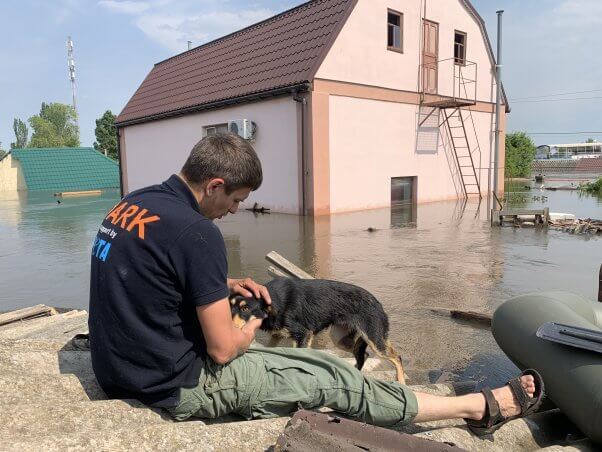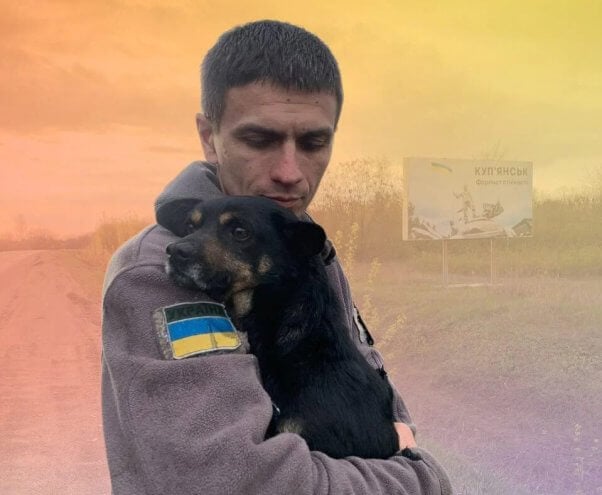Front Line Animal Rescuer in Ukraine: Infinitely Grateful for PETA
Teams backed by PETA’s Global Compassion Fund have pulled out all the stops to rescue animals from the war zone in Ukraine. Teams made up of courageous animal advocates like Animal Rescue Kharkiv (ARK) rush into cities and towns that have just been liberated in order to rescue and care for the animals left behind. With support from the Global Compassion Fund, PETA Germany supplies food each month for ARK’s clinic, shelters, and distribution to other shelters and residents in and around Kharkiv. After ARK’s clinic was bombed in 2022, support from the Global Compassion Fund helped rebuild it.
PETA Germany recently spoke with Igor Sobko, deputy head of Animal Rescue Kharkiv, about what life is like in the midst of a war.
PETA Germany: Igor, please describe what a typical day is like when you work near the front lines while also managing around 800 to 1,000 animals who are currently in ARK’s care.
A day like this is full of tasks, and it goes something like this: We answer calls that come in through the ARK hotline. They’re always emergency calls. People tell us where animals are injured or in distress. Then the rescuers set off immediately—we do that in the Kharkiv region. We save the animal or animals, which can also be dangerous for us. Then we take them to the veterinary clinic that PETA Germany helped set up. After an examination at the clinic, a decision is made whether to bring them to one of the animal shelters or admit them to the clinic. We receive around 70 to 90 calls each day. Work is also being done separately on evacuating animals from the combat zone in Donbass.
The clinic is open seven days a week, from 8 a.m. to 11 p.m. Thanks to PETA Germany, we also work in two wonderfully developed shelters for cats and two dog shelters. The animals are cleaned and cared for, and everything has to be as beautiful as possible and always tidy. We also have a spay/neuter project, and there’s another team that prepares the dogs and cats for departure by compiling all the necessary papers, checking their microchips, and issuing animal passports. They stay in contact with European animal shelters to secure adoptions and with guardians to arrange reunions.
There are currently 75 people working for us. The project gives them hope and the animals a future!
PETA Germany: Caring for so many animals is a Herculean task! How big has ARK become during the war?
Before the war, ARK was caring for 95 cats and 295 dogs. We had to evacuate them all from the line of fire. Our animal shelter was directly bombed at the beginning of the war, and unfortunately, animals died. We also had to help all the animals who were suddenly on the streets—the immense destruction had left them homeless. There were thousands of animals locked up in apartments in Saltivka, the most heavily shelled area at the time. People opened doors so they wouldn’t just die there. Suddenly they were everywhere—without a chance, without hope—and we immediately started taking them to safe areas in Ukraine and Europe. At the beginning of the war, that was still possible because special legal exceptions were made at the borders, but now we’re back to the normal regulations, which we strictly adhere to.
Without PETA Germany, we wouldn’t be able to help so many animals. We currently care for around 1,000 animals every day, no matter what the situation is around us. The Global Compassion Fund makes it possible for us to build these structures, and now we can keep them.
PETA Germany: How important is working closely with PETA Germany to your organization?
We’ve known PETA Germany for more than 10 years through smaller projects. For example, we worked together against the dog killings before the World Cup many years ago. We contacted PETA Germany as soon as the war broke out, and together we immediately evacuated animals to Europe—first via Poland. Since then and to this day, cooperation has been the basis of our work here. It’s not just about financial support. What I value most about working together is trust. I see unity in the special understanding of our work and in the good cooperation between the organizations. I see that the PETA Germany team’s experience allows them to identify the right plan and work with us strategically to make the best decisions in the moment. Thanks to our collaboration with PETA Germany, you, dear readers, can see what we’re doing here. PETA Germany supports us in the most difficult situations, like when we’re criticized for our work because not everyone understands our commitment to animals.
We’re always ready for any rescue and will make a plan, no matter the difficulty or circumstances—it must be done. PETA Germany and ARK will never just leave an animal behind!
PETA Germany: You also work in dangerous areas. How does the team deal with things when the job gets dangerous?
The fundamental rule of the rescue team is to adhere closely to schedules. We try to work within strict timelines, and we work with the military. This reduces the risk of being in the wrong place at the wrong time, which is the main reason people die from artillery fire, but there is also no guarantee and no certainty. We do it as strategically as possible. Working on an evacuation team means you have to be there at exactly the right time. We’ve done the analysis, and we understand that for each evacuation, it’s necessary to adhere to set times. Here’s an example of how incredibly important timing is: During one evacuation, there was a tricky situation and the Russians were very close. We had to leave exactly at 9 a.m. because we knew that there would be shelling from that point on. We were 15 minutes late and came under heavy fire. Getting out of that situation was life-threatening. The team crawled across the ground and into the trenches. They were physically unharmed, but it was close. We’re aware of how close we are to death here.
PETA Germany: You meet a lot of people who have lost everything. They give you their beloved animals to save them. Which story touched you the most?
The encounters with the military touch me the most because they give what is most valuable—their lives. In addition, they rescue and care for animals. They are very worried about them and very happy when we take them away to a safe place. Because in the long run, military bases are not places where animals can be adequately cared for. I was most touched by a situation in which a soldier, Andrey, rescued some cats. Even after he got wounded, he continued looking for a way to save them and ensure their survival. Sadly, Andrey died from gunshot wounds, but we now care for the cats he loved so much. There was also a situation in which we were evacuating a dog from Bakhmut and he didn’t want to come with us. He made it clear that we were to follow him, and he pulled his rescuer in a different direction. We decided to follow him, and he took us to a crumbling house, where there was another dog, his friend Tessa, who was too weak to walk. Of course, we took both of them with us, and both are fine! They will never be separated.
PETA Germany: Can you give a little insight into your feelings? How do you deal with the fact that the air raid is constantly on, you and the team see missiles in the sky, you hear bombs, and everything is destroyed? People you know are being killed—how do you keep going?
It’s impossible to get used to the loss of loved ones, friends, and acquaintances. I knew many people who are no longer alive. They were all very worthy and wonderful individuals. That’s the hardest part of this war. I realize that the war will go on for a long time, our economy will be destroyed, and there will be many more missiles. We are paying a very high price in this war. At the same time, I’m happy when we save animals and they find loving families in Europe! We reunite more than half the animals with their guardians after they’ve been separated by the war. These are very beautiful and important moments and experiences for all of us! The families send us photos of the happy animals, their home, and nice trips with them in nature. These animals survived abandonment and gunfire and are happy now. It seems to me that such happy stories provide the inspiration to live and continue working here.
PETA Germany: What would you like to say to the people reading this interview?
It’s important for us that every person reading this article understand this: We’re alive, and we’re still going! It would be nice if people felt as though they were connected to Ukraine and the Ukrainian people. Then it’s like an exchange based on compassion.
And we will feel the support of all the readers, which we need very much. The war brought us into a new reality in a single day and gave us tasks that would sometimes have been impossible if we had to handle them alone.
But we’re not alone! The insight, the support, the communication, the exchange, the help—we are infinitely grateful!
Show Your Support for Animals in Ukraine
Help teams like ARK rescue animals by donating to PETA’s Global Compassion Fund.



